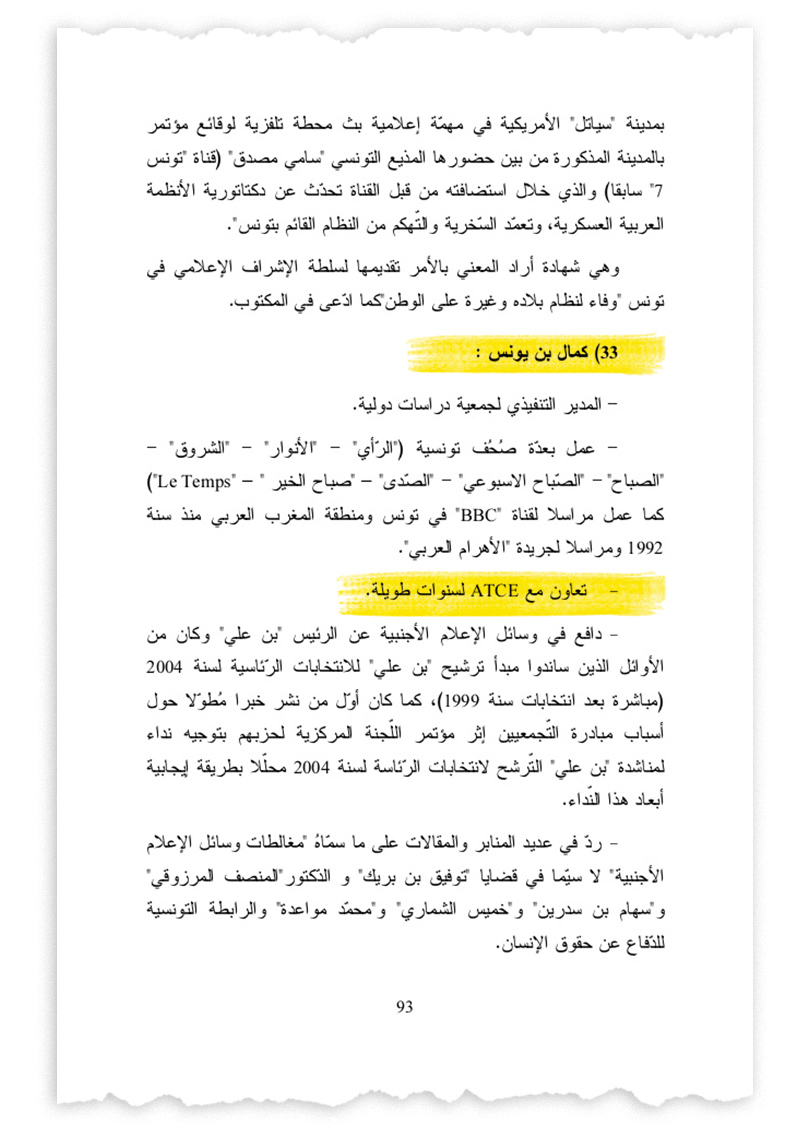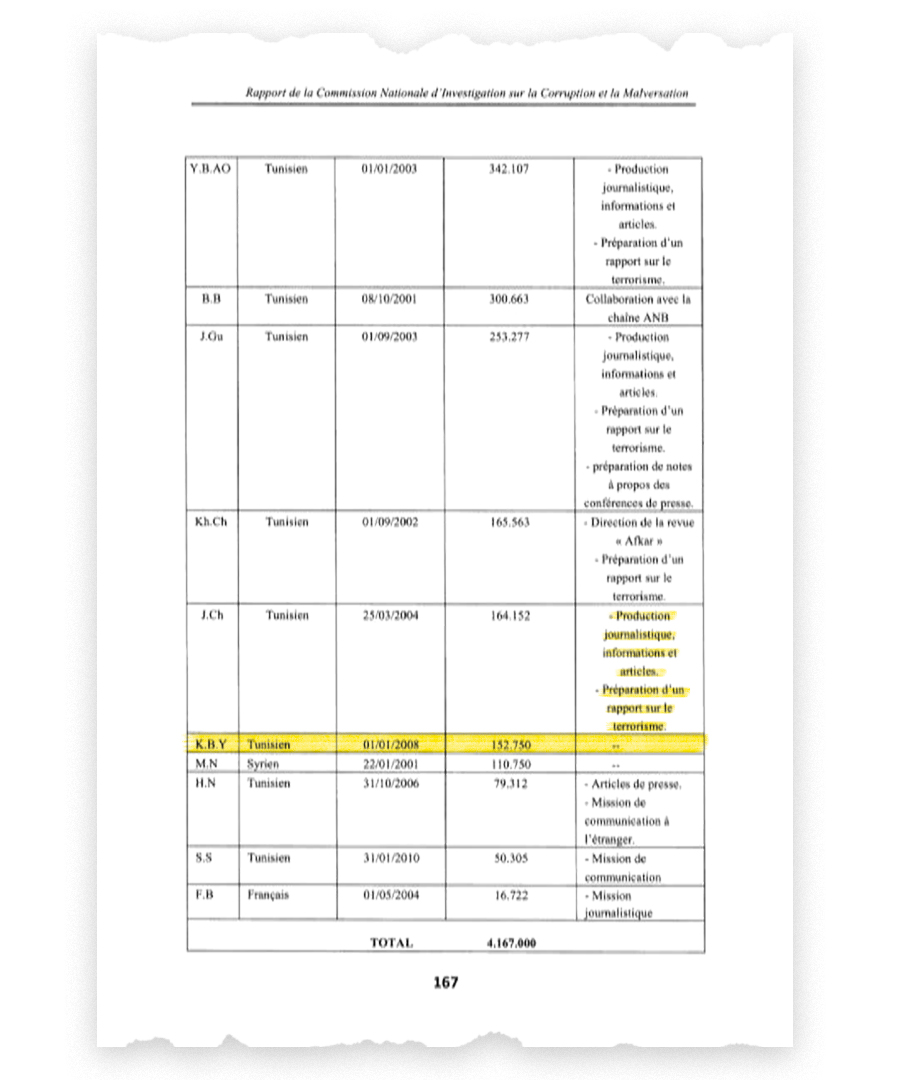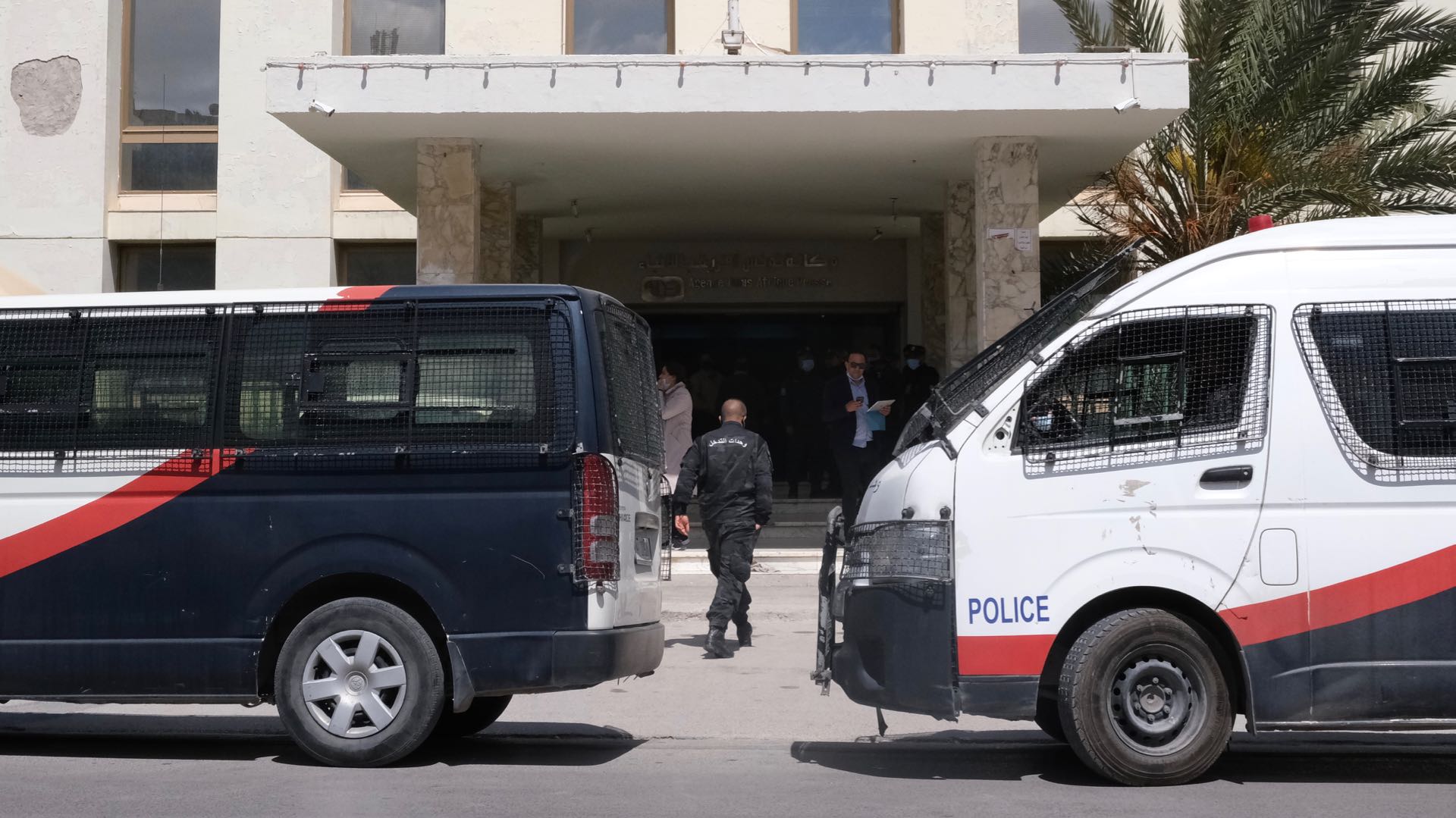No reason was given to justify the head of government's decision to dismiss the then CEO Mouna Mtibaa, who had held the position for 10 months. Accused of being an ally of the Ennahdha party, Kamel Ben Younes also supported the Ben Ali regime, collaborated with the Tunisian External Communication Agency (ATCE), and recently participated in the political conference of the Ennahdha movement's youth.
"Our role is to report, we are the wholesalers of information, we don't rely on political pressure", explains Sonia Ben Abdallah, head of the economic and financial desk. For many TAP employees, this move is reminiscent of the agency's dark days and a revolution that is still waiting to happen.
KAMEL BEN YOUNES "COLLABORATED WITH THE ATCE FOR MANY YEARS"
Kamel Ben Younes' name appears in two reports concerning the former Ben Ali regime. In 'Le Système de propagande sous Ben Ali, Le Livre noir' (2012) it is stated that "[Kamel Ben Younes] collaborated with the ATCE for many years", and the ATCE (the Tunisian Agency for External Communications) has long been the cornerstone of the propaganda system established during the Ben Ali regime.
This document was published under the presidency of Moncef Marzouki. Based on the archives of the Carthage Palace, the 354 pages detail the organised propaganda system set up by Zine el-Abidine Ben Ali, and lists 90 journalists who
"collaborated with the former regime".

"The Propaganda System under Ben Ali, The Black Book", Presidency of the Tunisian Republic, p.93
According to the document, Kamel Ben Younes "defended President Ben Ali in foreign media and was among the very first to support President Ben Ali for the 2004 presidential elections". In this section dedicated to him, he is also accused of having used various media platforms to attack "the disinformation of foreign media" and several journalists and former opponents of the regime (Taoufik Ben Brik, Moncef Marzouki, Sihem Ben Sedrine, Khemais Chammari, Mohamed Mouâda and the LTDH).
The journalist is also mentioned in the report of the National Commission for Investigation of Corruption and Embezzlement (2011). Under his initials 'KBY', he appears in a chart showing "the agency's main collaborators by amounts paid for external communication". He is said to have received 152,750 dinars for 'journalistic production, news and articles' and 'preparation of a report on terrorism'. This sum was paid out from 1 January 2008, the date marking the beginning of his collaboration with the ATCE, "according to data provided by the agency".

Report of the National Commission for the Investigation of Corruption and Embezzlement (2011), p.167
According to several sources within the TAP agency, these three initials belong to Kamel Ben Younes. The chart lists a total of 13 journalists. The ATCE would have spent 4,167,000 dinars to compensate them for supporting and promoting the former regime between 1999 and 2010.
When contacted by Inkyfada, Mr. Ben Younes categorically denies having received money from the ATCE. He added that he had only been hired "on contract" by the Prime Minister as "an international communication consultant, in charge of being the executive director of the Association of International Studies" from 2007 to 2009.
When asked about his support for Ben Ali, he responded that "it is not true, and even if I did, it might have been a point of view in a business matter". "But I have never been asked by anyone to defend him", he insists.
TAP, THE FORMER LINK IN ABDELWAHEB ABDALLAH'S PROPAGANDA SYSTEM
Accused by these reports, as well as by many journalists and opponents, of formerly collaborating with the dictatorship (and particularly with the ATCE), Kamel Ben Younes reopens the difficult history of TAP.
Created in 1961 by Habib Bourguiba, this agency was an institution in a newly independent and sovereign country. From its initial purpose "to collect elements of complete and objective information, both in Tunisia and abroad", according to its statutes, it became a simple propaganda relay for Bourguiba's regime.
During the 1987 coup, Abdelwaheb Abdallah (former CEO of TAP), was Bourguiba's Minister of Information. The new president Zine el-Abidine Ben Ali, appointed Hédi Triki (the journalist who had announced the November 7 declaration on the radio) as the agency's deputy director general (DGA). Already at that time, journalists were protesting against the appointment by "wearing armbands as a sign of protest", Enrique Klaus tells Inkyfada, based on several interviews with agency employees.
On the other hand, Abdelwaheb Abdallah was relieved of his duties. A few years later, he took the reins of the ATCE as it was created in 1990. "Ben Ali knew nothing about the media, so he entrusted the management of the media to Abdelwaheb Abdallah", adds the researcher. "He remained his advisor until the end." He became the organiser and manager of Ben Ali's propaganda apparatus, which included TAP and ATCE.
"TAP did editorial work for propaganda and ATCE was more aimed at managing budgets and sending people to foreign TV stations, for example", Enrique Klaus told inkyfada.
In this sense, Rachida Ennaifer testifies that in December 1987, when she was a journalist at La Presse, she could not publish her report on the municipal elections in Ksar Hellal because of the sensitive nature of the information: an independent list had just won the municipal elections there. "Long negotiations began with the newspaper's director, who finally promised me that if the TAP agency published the information, my article could be published. " After a "one and a half line dispatch [happened] upon the teleprinter*", his article "could appear in La Presse newspaper with a different title".
This doctor of law and former communications advisor to Kaïs Saïed "tells this brief story just to illustrate the place occupied by a national press agency, the role it can play and why today the Ennahdha party and its allies want to get their hands on it". Under Ben Ali, the TAP agency were thus the ones to officially draw the line of the regime, which was not to be crossed.
Established in 1990 by a circular (before being supplemented by Law 90-76 which does not precisely define its statutes), the ATCE is theoretically responsible for promoting the regime abroad. In practice, it would function as a "special apparatus that controls the media", as described in " Le Système de propagande sous Ben Ali, Le Livre noir" (2012). The document states that: "With the human and material resources at its disposal, the ATCE has succeeded in tightening its control over the media by extending its influence over the written press and the public and private audiovisual scene in Tunisia".
But in order to do this, they had to rely on TAP. "In the absence of a legal status, the ATCE could not recruit its own staff, and so it drew on the staff of TAP. This is how the latter's staff was artificially inflated, putting a strain on its budget as a result of the former's salary expenses", writes Enrique Klaus in the journal 'Politique africaine'.
TAP's workforce was not only a breeding ground for the ATCE but also served Ben Ali's entire propaganda communication system. "What they abused were the dispatchments", explains Enrique Klaus, "people could work, be a civil servant at TAP, but then also be dispatched to for example become the spokesperson for a ministry".
So much so that "all those in charge of (...) the country's information sector have passed through the TAP agency, like a game of musical chairs that has been going on since 'the change'", as ‘Patriote’ (a pseudonym) states in a post published in Nawaat on September 25, 2005, at a time when they were still merely a blog, subject to censorship.
‘Patriot’ gives nearly a dozen examples illustrating this system. Among these we find Oussama Romdhani. As the CEO of ATCE in 2005, he was also a journalist at TAP and "was, for a few years, the agency's New York correspondent".
Abdelhafidh Harguem, another TAP journalist, was at the time Director General of the Arab Radio Union (ASBU) and "held the position of director general at ERTT [Tunisian Radio and Television Establishment] for many years". According to the same source, Mr. Harguem was also "Ben Ali's attaché at the Ministry of the Interior".
From 1993 to 2009, TAP no longer recruited through an application process. "The people who were recruited during this period were recruited according to their membership of the RCD [the Democratic Constitutional Assembly], or the police", Enrique Klaus told Inkyfada. "Due to a recruitment and promotion policy based on political allegiance, favouritism and nepotism, the professional skills of the journalists and agents of this company have considerably declined over the years", describes the report of the National Instance for the Reform of Information and Communication (INRIC).
THE REVOLUTION AT TAP, "AN ABORTED TRANSITION"
This system of maintaining the media elites at the heart of the propaganda apparatus lasted until 14 January 2011 and beyond. In the words of Néjib Ouerghi, CEO of the agency in 2011*, TAP was "navigating by sight" at the time of the revolution.
Nejib Ouerghi appeared as head of the agency in May 2010 and would remain in this position until 2012. He was spared the wave of evictions of former regime officials, despite the fact that he had directed the RCD newspaper 'Le Renouveau' between 2003 and 2010. Under his leadership, some of TAP's staff, particularly the younger ones, tried to put various reform mechanisms in place (such as the creation of a reform committee).
However, faced with the predominance of the old media elite, the anti-reformist tendency prevailed. Some of its former members were even reinstated. In this context, Taïeb Yousfi, former officer on dispatch and former head of the Prime Minister's office (1999-2012), would replace Néjib Ouerghi as head of TAP.
Suspended in 2011, the ATCE was officially dissolved in 2012. TAP, on the other hand, is still burdened by its past. "The structure of TAP has not changed, the same editors remained in place after the change of CEO in 2012. The statutes are regulatory texts that have not been changed", says Enrique Klaus.
However, some of the agency's journalists try put things into perspective. "There are no longer any instructions from Ben Ali's regime, or Bourguiba's before him. After 2011, the administration and the editorial secretariat became independent", explains Oussama Bouchiba, a young journalist who joined TAP's audiovisual unit in March 2019.
Sonia Ben Abdallah, who has been with the agency for 24 years, is more nuanced. According to her, TAP is independent "on a theoretical level". "[We] have acquired editorial independence [...] and we have managed to maintain this independence several times. If we are asked to publish information that does not meet basic professional criteria, we do not publish it." However, "the problems still exist. It is a legacy that we have inherited, it is not easy to eradicate it in such a short period of time." In 2021, the agency celebrates its 60th anniversary, 10 years after the revolution.
THE CASE OF KAMEL BEN YOUNES, A "SYMBOL" OF THE DESIRE FOR CHANGE
While TAP is trying its best to get rid of this legacy, the appointment of a former collaborator of the ATCE as head of the agency (said to be close to Ennahdha), has been met with a general refusal from its journalists and employees.
On Tuesday April 13, 2021, Kamel Ben Younes went to the agency's headquarters, accompanied by police officers. They managed to enter the agency. "The way he was planning to start his career at TAP was unheard of", testifies Sonia Ben Abdallah. The climate was already tense when more law enforcement officers arrived as reinforcements. They violently repressed the employees back into the main hall, injuring several people in the process. The incident shocked those present as well as several civil society organisations, both because of the violence involved, and the mere presence of police officers in the news agency.
Tense exchanges between TAP employees and police officers at the agency's headquarters on April 13, 2021. Photo credit: Nissim Gasteli
On 19 April 2021, Kamel Ben Younes finally resigned as CEO, but for Sonia Ben Abdallah this is merely symbolic. “It is now or never to demand a reform of TAP, and the criteria for appointing CEOs". On this point, Oussama Bouchiba fully agrees with his colleague: "Journalists are calling for the appointment of a CEO with a fixed objective, a good CV and a plan".
The power to appoint a CEO of the agency falls under the exclusive authority of the Head of Government. This power remains a legacy of the former regime, insofar as it was not modified after the revolution. He furthermore appoints the CEOs of National Radio and National Television, but in these two cases he must obtain the consent of the Independent High Authority for Audiovisual Communication (HAICA). For Enrique Klaus, this means that "TAP has one less safety net compared to public broadcasting". In 2012, the INRIC report had already recommended "the revision of the agency's legal status".
"These demands are nothing new", says Sonia Ben Abdallah, referring to several petitions of TAP's journalists calling for change, long before Kamel Ben Younes' arrival.




